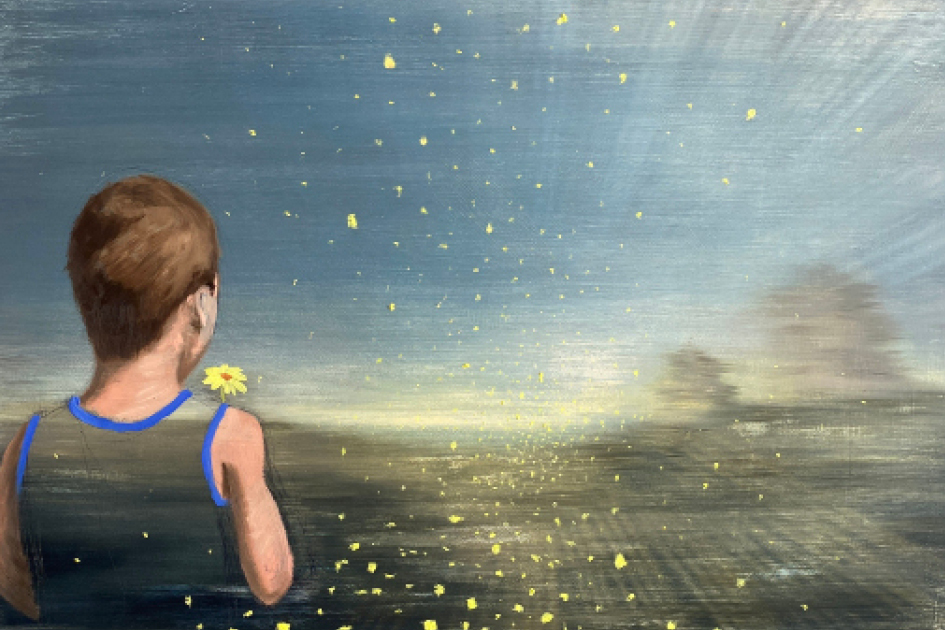Editor’s note: Each month, In Touch staff members respond to an excerpt from Dr. Stanley’s teachings. For this round, Jamie A. Hughes, John VandenOever, and Kayla Yiu discuss what it means to yearn for God and how He meets our needs.
In John 4, Jesus tells the woman at the well, “Everyone who drinks of this water will be thirsty again; but whoever drinks of the water that I will give him shall never be thirsty; but the water that I will give him will become in him a fountain of water springing up to eternal life” (John 4:13-14). We know Jesus is the only one who can truly satisfy our desires and meet all of our needs, but what does His provision look like? And how can we actively cultivate our own longing for God’s presence? This month’s excerpt comes from Dr. Stanley’s sermon “Hungering and Thirsting for God”:
There’s not a single man on the face of this earth, nor a single woman, who can meet all of a man’s needs or all of a woman’s needs. You know why? … Because God created us for Himself, and He’s not going to create anyone else on the face of this earth who can meet all of another person’s needs. No one can. He made us for Himself. Listen, He longs for us to long for Him. He desires for us to desire Him. He yearns for us to yearn for Him. He wants us. He wants the best for us, to give us the best in life. He’s provided it. It’s there open, ready for us.
Kayla Yiu: It’s important to make the distinction that people meet some needs but cannot meet all of them. What needs of yours do people meet? What needs don’t they meet?
Jamie A. Hughes: I would say that our parents are a prime example. We expect them to provide safety and comfort when we’re young, encouragement when we’re moving out into the world, and wisdom as we move into adulthood. But quite often, our parents fail us in one or more of those things, and that’s when we begin to see that they were never truly able to provide in the ways that God can.
John VandenOever: Parents are an excellent starting point. I have been incredibly blessed to be able to draw warmth and insight from them, even to this day. Even in disappointment, I am able to walk in their shoes as a parent. Their mistakes make more sense now that I have kids of my own. I see myself ache in the same ways over my shortcomings.
I always knew my parents were very loving, but I had less of a grip on God's mercies. So that's been a real difference in growing in faith—to see how God is greater than His rules for right living.
Jamie: We want to get answers, surely, from our parents because we trust them. We believe they have our best interests at heart. But at times, they don’t. We fail to approach God for these needs sometimes, I think, because we haven’t worked on that relationship—we don’t truly see Him as “Father” or “Protector.”
Kayla: Sometimes people talk as if either God meets our needs or people meet them. But who's to say God isn't meeting our needs through people?
John: He very much does. I can think of times I’ve received encouragement, wisdom, and affirmation through a listening ear, shared experiences, laughter from friends and mentors.
We fail to approach God for these needs sometimes because we don’t truly see Him as “Father” or “Protector.”
Jamie: God uses people to meet our needs—to fill holes and provide the best. It brings to mind two men in my former church. One was literally abandoned by his family when he was a teenager, and another man in the congregation, a single man, took him in and raised him.
Today, that younger man is a father of four. He is a loving husband, and he helps with all sorts of youth ministry programs. I think it is because a slightly older man stepped in and filled that gap, loved him well, and continues to love and support him. The older man thinks of him as a son, though he has never had children biologically.
John: My parents did something similar for a young teenager in our church who was in foster care and became pregnant. They took her in, helped her through the pregnancy, and supported her. It was a very difficult season for our family, though. My sisters were also older teenagers, and this girl was difficult to live with. It came with great sacrifice. But I was so happy that my parents did this. We are the body of Christ. It’s a tall order, but that's how we're supposed to serve each other.
Jamie: That’s the way it should be done, John. I think sometimes it’s easier for us to focus on people and how they can help meet our needs than it is to figure out how to rely on God. People are here. They are tangible, present, in our limited field of vision.
John: But learning to trust God—to see Him answer prayer or remove concerns—is wonderful. I know there are many circumstances that don't change, but we learn that He is there and cares.
Kayla: What’s difficult about the idea of God working through people is that it comes with a temptation to try and parse out when a person is and isn’t operating “from God.” But do we even have the ability to do that?
Jamie: I think that comes through time and discernment. There are certain friends I’m not close to now. However, if one or two of them spoke into my life now, I’d have an easier time believing they were “of God” and were in it for my good. I can’t necessarily say the same for some church people I don’t know well, even though they have all the trappings of faith.
It's hard to be completely beneficent. We’re a mess of motivations.
John: It's hard to be completely beneficent. We’re a mess of motivations.
Jamie: Dr. Stanley’s quote leans very heavily on intimacy, and I think that’s what it all boils down to with God and with people—a willingness to know and be known. To be willing to reach out when you feel something lacking or when you feel you have something to offer.
Kayla: When Dr. Stanley says God isn’t going to “create anyone else on the face of this earth who can meet all of another person’s needs,” it might be tempting to think that’s selfish of Him, or jealous. How do you come to terms with that? Is there another way to frame it?
John: Faith is believing that God is enough. We must learn that we are broken and in desperate need of God alone. He blesses us with others, but they are not the end goal. So whenever others aren’t providing what we need, it’s a perfect time to understand that God wants us.
Kayla: That returns us to Jamie's comment on intimacy—more than anything else, it’s about being near to God.
Jamie: I find something of God’s love and graciousness in my husband, in my children, in my friends. I see pieces of the divine whole in everyone around me. But no matter how many people I add together, they are not God. They cannot equal His love and compassion, His justice and mercy. That can come only from Him.
I often think about a quote from Pascal: “There is a God-shaped vacuum in the heart of each man which cannot be satisfied by any created thing but only by God the Creator, made know through Jesus Christ.”
No matter how many people I add together, they are not God. They cannot equal His love and compassion, His justice and mercy. That can come only from Him.
Kayla: Jamie, that reminds me of when Dr. Stanley says, “[God] yearns for us to yearn for Him.” How do you notice your own desire for God? In what ways does it manifest?
John: We've been studying John 6:37 in my small group: “Everything that the Father gives Me will come to Me, and the one who comes to Me I certainly will not cast out.” Breaking that down has been so comforting and radically loving. God is keeping me. He claimed me and draws me to Christ, and Christ will hold all that are His own. He will never remove us. If I embrace that, it gives me hope for any challenge I face.
Jamie: There is such belonging, such love, such acceptance in that single verse. But sometimes, that’s difficult to feel and hold on to.
Kayla: I've noticed that I have to make space for my desire for God. For example, if I'm busy and distracted and my mind is filled with noise, I can’t even fan the flames of longing for God. But when I go for a walk or spend time outside reflecting, the desire for God is easily accessible. It's never far—but I have to carve out space and time to even notice that a desire for God is there.
John: Yes, I can tell the difference markedly when a day doesn't begin with space, prayer, Scripture.
Kayla: And unfortunately, I also notice my desire for God when I feel as if things in the world or in my friends’ lives are falling apart. It comes as a yearning for Him to take over and restore.
It gives me a new perspective for hardship, actually. Without hardship, how much would I long for God's redemption? It’s unfortunate to admit, but true.
My desire for God is never far—but I have to carve out space and time to even notice that it’s there.
John: Yes, if we had all we needed in every moment, our focus on God would be far harder to grasp.
Kayla: It's already hard to grasp, and I have plenty of issues! Haha.
John: What role does anxiety play in these situations of hardship?
Kayla: Anxiety is definitely there, but sometimes it's hard to distinguish between it and grief and mourning—which Jesus called “blessed” in the Beatitudes (Matt. 5:4). I think there's a fine line, and I’m not always sure which side of it I’m on. Mourning is so directly linked to acts of compassion that I'm hesitant to let go of it. One example that comes to mind would be the people experiencing homelessness who knock on my door for help. I never want to stop mourning for them, to stop feeling anxious about what to do.
Jamie: Right now, I’m feeling it most acutely with my oldest child. He has special needs, and I constantly worry that he’s not going to be able to live a “normal” life, to provide for himself when I am no longer able to. He doesn’t grasp that the things I’m trying to teach him now are for his good, that they will help him. I’m very anxious for a future that I cannot see. I’m trying to control a situation that is not even really in my control at all to begin with.
John: I feel things like that for my children, as they go through college and wrestle with so many things, but I also want them to land with hope and joy and contentment despite all of it.
Kayla: It's a balance for sure—one that I definitely struggle with.
All that to say, I think mourning is a type of yearning for God, which I’ve never really thought about before.
Mourning is a type of yearning for God.
Jamie: I agree with that for sure. You know something’s wrong, something’s evil or unbalanced, and you want to see it repaired and restored. We turn to the only One who can do something about it. I have to keep my eyes and my heart open. I have to keep willing to be a vessel. God can use that, I think.
John: Just last week a friend reminded me how God works out His restoration through people. My son's car broke down on his way home from college and we had it towed to a shop. We had our own theories, but this shop came back with a $1900 bill. I asked a friend if he’d help me drive it home so we could just find someone who wanted to take on a car project and sell it for cheap. But instead, my friend took a look at it and spent an extra two hours replacing a single hose—and $15 later, we had the car back! It was something I could not do on my own, but he went the extra mile from volunteering to drive it back home to getting involved, and he's even offered to drive it around with me to be sure we got to the problem. Very Christlike.
Jamie: I think it’s a “both-and” thing, really. People aren’t God. They can’t replace Him, but that doesn’t mean we should try to live without them any more than we should try to live without Him.
Maybe people help hone our loves, desires, and needs. They point us to God. And in return, He keeps bringing others into our life—people into whom we can in turn pour that love and wisdom. It’s a beautiful, generative cycle with God not only at the beginning and the end but at the very center.





